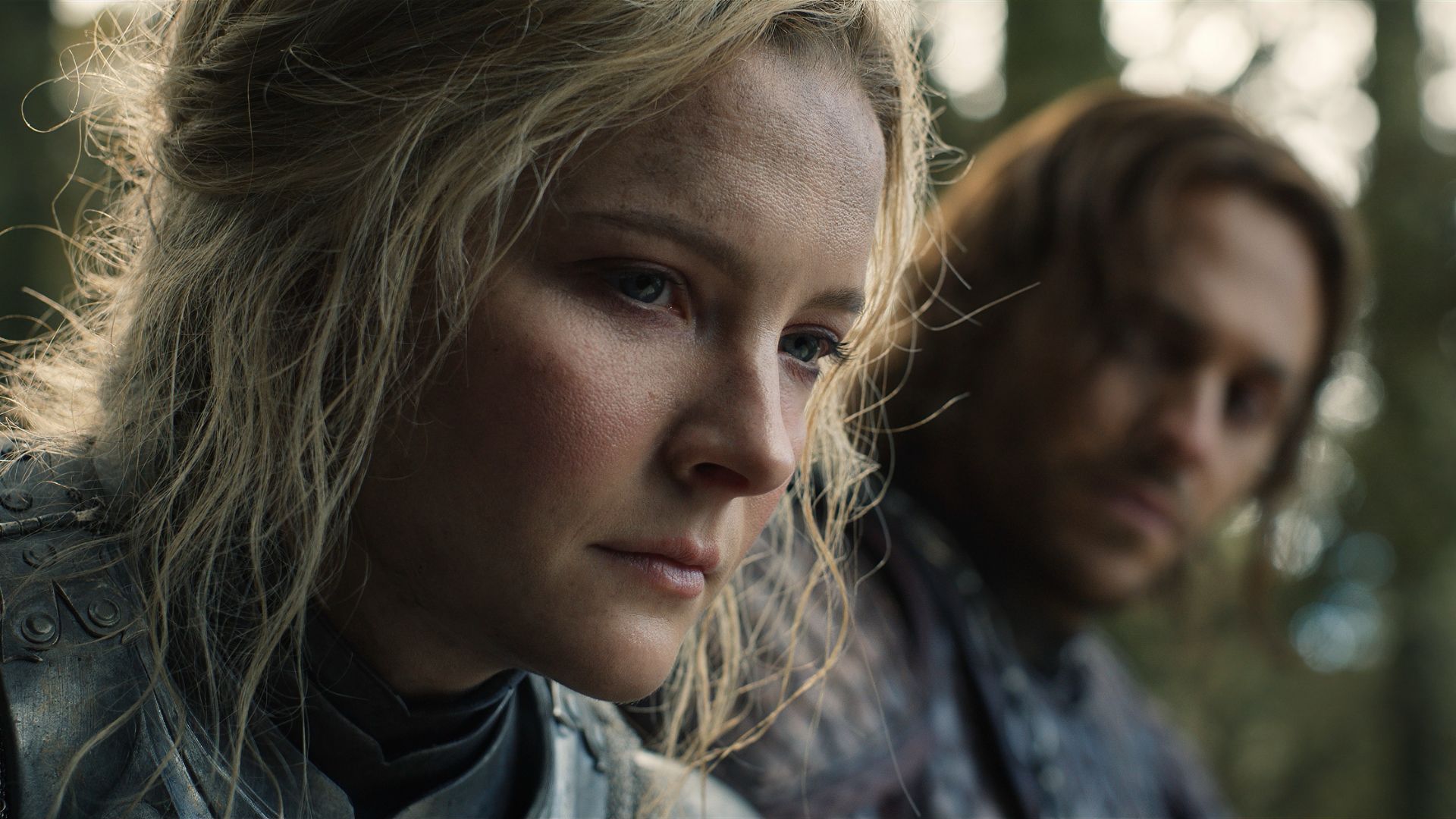GamesRadar+ Verdict
The Rings of Power brings together disparate storylines to tell a focused narrative that’s spectacular in scope and changes the face of Middle-earth quite literally.
Why you can trust GamesRadar+
Warning: the following contains spoilers for The Lord of the Rings: The Rings of Power episode 6. Turn back if you haven't seen the new installment in Amazon's epic Tolkien adaptation.
There comes a moment in every great TV show’s run where everything clicks into place – when you, as a viewer, realize you can’t stop watching; that you’re here for the long haul, however many seasons are ahead. For the Sopranos, that episode was the show’s self-contained fifth installment, ‘College’, in which Tony finally acts on his gangster impulses. For Lost, it was ‘Walkabout’ in which John Locke’s secret is first revealed. Games of Thrones’ first season was solid throughout, but the infamous ninth episode, ‘Baelor’, guaranteed its place on the pop-culture pantheon. Now, that moment has come for The Lord of the Rings: The Rings of Power.
The show’s sixth episode has the feel of a finale. Storylines connect as Galadriel and Arondir finally meet. A villain goes from simply intriguing to entirely engrossing. A volcano erupts and changes the face of Middle-earth forever. And that’s not to mention the battle, an epic fight between the Orcs and Southlanders that dominates the runtime and would not have been out of place in one of Peter Jackson’s movies. The Rings of Power series has continuously blurred the barrier between film and television, and the line has been completely wiped here.
I’m getting ahead of myself. The episode starts with Adar, played with fascinating reservation by Joseph Mawle, giving a pep talk to his Orcish children. They have been slaves, he says, but no longer. Their time has come. No more hiding in the shadows, waiting for daylight to disappear. They march on the stronghold, yet Arondir has set a trap – the humans have run to a nearby town where they set up another ambush. There’s some tepid celebration as they watch Adar’s armies being blown up, though there’s still a fight on the horizon. Bronwyn gives a disappointingly cliché speech to muster the men, yet her words to Theo moments later – about light conquering darkness – are resoundingly Tolkien-esque. Meanwhile, on a boat heading to Middle-earth from Númenor, Isildur and Galadriel talk for the first time. Elendil’s there. She issues an order to make haste.
It’s a decent but not spectacular start, with a few good lines here and there but nothing too riveting. However, as Gandalf would say, it's the deep breath before the plunge. Moments later, chaos erupts: Arondir and Bronwyn are fending off a wave of Orcs, Arondir taking on one particularly large fella. Despite the Elf being one of many main characters, the fight is framed and shot in a way that gives tension – as if he really could die. A heroic Bronwyn saves him and there’s victory. A weaker show would have ended there, the conflict coming to an end. Indeed, it feels like a set piece coming to a close. And then the Southlanders realize they’ve been killing their own kind under Orcish masks. Another wave of Orcs attack. The (good) humans take shelter in the keep and Bronwyn’s hit by an arrow that pierces through her. It’s bloody and tense and riveting.
Adar breaks into the barn and starts brutally murdering Southlanders. Arondir, more emotional than we’ve seen before, is willing to give up Bronwyn to hide Sauron’s sword. It’s Theo, though, who breaks and gives Adar the weapon. And then, when all hope is lost, a surprise: Galadriel really did make haste. Like Éomer’s riders at Helm’s Deep, the Númenorians rush into combat. There are some slightly gratuitous shots of slow-motion horses (it works better here than in episode three, though it’s still a strange choice) but that doesn’t speak to the thrilling, nonstop action that unfolds, brilliantly directed brilliantly by Charlotte Brändström. It’s a fight that unites these disparate story threads, giving some needed cohesion to the overall series. And The Rings of Power does not let up. Galadriel and Halbrand chase a fleeing Adar, with Halbrand spearing the villain’s horse and almost killing Adar before Galadriel stops him. “Do you remember me?” Halbrand asks. “No,” Adar responds with a sinister smirk. (Is that because Halbrand’s actually the shape-shifting Sauron? Probably.) It’s a haunting moment and once again shows Adar to be a great antagonist – something that becomes even clearer once the dust has settled.
Galadriel goes to confront Adar, chained up in the barn. I wrote last week about finding it hard to love Galadriel as a character, and Adar points out exactly why: her rhetoric – that of an unflinching, battle-hardened leader – is dogmatic. He calls her a mirror to Morgoth, and he has a point. Galadriel’s not been going about her quest particularly well. She has no sympathy for anyone who dies during her journey to rid the world of Orcs. After all, in the opening episode, we saw her own party of warriors turn on her, the group not wanting to sacrifice their lives because of her hunch about Sauron. Could and should she have approached that differently?
The scene with Adar gives Galadriel’s character more nuance than any other in the series. Shot with dutch angles, the whole thing feels sinister and uneasy. Where Tolkien’s Lord of the Rings told a story of good versus evil, The Rings of Power is playing in a gray area – an area that suits today’s modern television climate. And somehow, that’s not all for Galadriel. She sits down with Halbrand and the sexual tension that’s been building goes into overdrive. They both felt something racing into battle together – could this be love? When Halbrand turns out to be her brother’s killer, it’s going to be awkward (yes, I’m doubling down on him being Sauron).
As the Southlanders celebrate, Theo realizes the sword that Adar was hunting is missing. One of the evil men managed to get away with the weapon. Even worse, the sword’s not just a blade, but a key to unlocking the dam above the Southlands. And even worse still, once the dam’s unlocked, the water rampages across the land and into the earth’s belly, setting off a volcano – one that will one day be called Mount Doom. Galadriel watches as the dust washes over her. It’s an unsettling, spectacular, cinematic image to finish on.
By telling a focused story and bringing characters together, The Rings of Power delivers its best episode yet – an episode that, if the show holds its quality in check, could prove the point where the series hooks even the naysayers. It’s a stunning statement of intent for the next two episodes (and the already-confirmed four seasons beyond that).
The Lord of the Rings: The Rings of Power is available now on Amazon Prime Video. After more Rings content? Check out our guide to the Lord of the Rings timeline and our interviews with the Rings of Power cast and showrunners.
More info
| Genre | Fantasy |

Jack Shepherd is the former Senior Entertainment Editor of GamesRadar. Jack used to work at The Independent as a general culture writer before specializing in TV and film for the likes of GR+, Total Film, SFX, and others. You can now find Jack working as a freelance journalist and editor.



